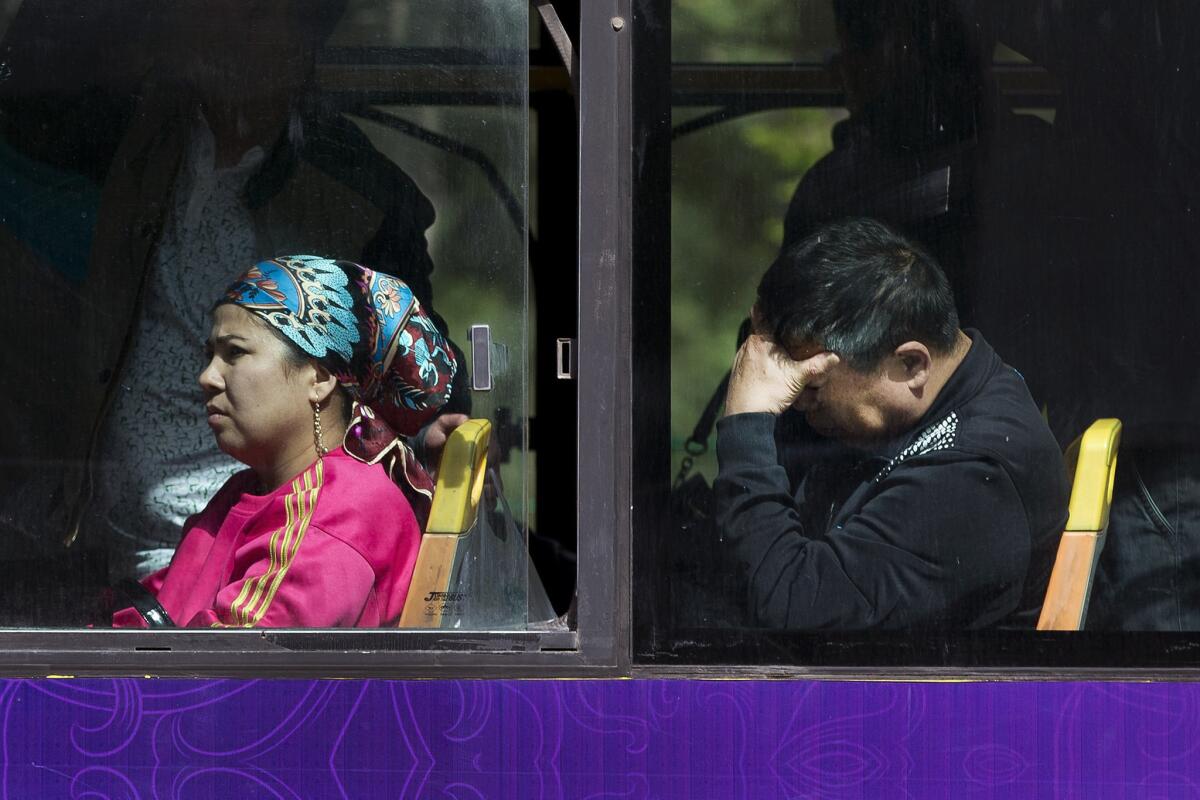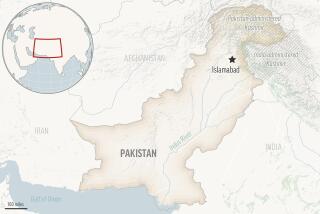China urges joint anti-terror efforts, but reveals little about attacks on its soil

A Chinese man sits behind a Uighur woman on a public bus in Urumqi, in China’s northwestern region of Xinjiang, on May 23, 2014.
- Share via
Reporting from Beijing — In September, a group of knife-wielding men laid siege to a coal mine in China’s far west, killing at least 11 civilians, three policemen and two paramilitary police officers -- a death toll greater than January’s assault by Islamic terrorists on the Charlie Hebdo magazine office in Paris.
The bloodbath at the mine in Terek township, in China’s Xinjiang region, apparently touched off an extensive manhunt ranging over 500 square miles.
But until this week -- more than two months after the incident -- Chinese authorities never even so much as acknowledged the attack had happened. State-run media carried no dispatches on it, though Radio Free Asia, a U.S.-government funded news outlet that runs a Uighur-language service and is blocked by Chinese Internet censors -- published several reports, putting the death toll as high as 50. (A brief online statement and photos last Saturday from China’s Ministry of Public Security, posted soon after the Paris terrorist attacks, was quickly taken offline.)
Finally, on Friday, the state-run Tianshan and Xinhua news agencies carried triumphant reports announcing that Xinjiang police had, after a 56-day manhunt involving gunfights, “disbanded a terrorist group,” killing 28 suspects and securing the surrender of a 29th.
The official reports added that the “terrorist group was directly guided by an overseas extremist group” and was led by two locals, Musa Tohniyaz and Mamat Aysa; their names indicate that the men were members of China’s Uighur minority. But the government refused to name the “overseas extremist group” because “investigations are still underway.” It gave no details about the slain suspects or their supposed motivations, other than to say that they had watched extremist videos.
In wake of the Paris attacks last week and Islamic State’s slaying of its first Chinese hostage this week, Beijing has vowed to hold the kidnappers accountable and to step up counterterrorism cooperation with other countries. And it has called on other countries to lend more support to China’s own anti-terrorism efforts, particularly against the East Turkestan Islamic Movement, or ETIM.
“The U.N.’s leading role should be brought into full play to combat terrorism, and a united front in this regard should be formed,” China’s foreign minister, Wang Yi, said at the Group of 20 meetings in Turkey last weekend. “China is also a victim of terrorism, and cracking down on ETIM should become an important part of the international fight against terrorism.”
On Thursday, Chinese President Xi Jinping, meeting with world leaders at the APEC summit in the Philippines, echoed those comments, while adding that “there must not be double standards.”
But even as China calls for more collaboration on counterterrorism, the lack of transparency about the coal-mine attack -- and other recent incidents -- underscores how China is still deeply uneasy about revealing basic facts about terrorism on its own soil and efforts to hunt down alleged conspirators. And that may leave potential partners wary.
“Whether those killed or convicted were actually responsible for the violence in question, or what motivated them, will remain unknown to the outside world,” Human Rights Watch’s China director, Sophie Richardson, said in a commentary earlier this year about China’s lockdown on information about such incidents in Xinjiang.
Whether China can force greater international cooperation without being more forthcoming about its problems and its countermeasures remains to be seen. The situation is further complicated by the fact that Uighurs in Xinjiang have long complained about restrictions on their religious practices, clothing and use of the Uighur language at schools and workplaces, plus exclusion from economic development efforts.
Human rights groups say those systematic violations -- and not just out-of-the-blue radicalization -- are part of what’s fueling unrest in Xinjiang.
Many questions remain about the assault on the coal mine in Baicheng county, a rural area of just 230,000 people spread out over an expanse bigger than Connecticut. The county sits at about 9,000 feet above sea level, with farming and livestock among the primary industries. Hunting is common, along with horse racing, cockfighting and wrestling.
Employment ads for the mine that was attacked indicated that the operators were recruiting workers from eastern and southern China, offering salaries of up to $2,500 per month -- more than double what coal miners in other regions make. The Radio Free Asia report said that the workers slain at the mine dormitory were members of China’s Han ethnic majority; Uighurs often complain that an influx of Han Chinese has hurt their livelihoods and that Han business owners discriminate against them.
The state-run media reports said those who carried out the mine attack began watching “extremist videos” in 2008, but neither ETIM nor any other group has claimed responsibility for the Terek incident. The Radio Free Asia reports, which quoted numerous local residents and low-level officials, said the attackers were angry over being forced to dance during campaigns designed to “expel extremism,” and that one had been fined for failing to inform the local government that he had adopted a daughter born out of wedlock to one of his friends.
Exactly who was among the group of 28 slain suspects remains unclear. But wanted posters seen in the area last month included several women. Radio Free Asia quoted a police officer in the area as saying that the last 17 suspects were blown up in a cave where they were hiding; the report said a 9-year-old girl, a 6-year-old boy and a 1-year-old boy were among those who died.
Pictures accompanying the Chinese state-run media reports showed black-clad forces with automatic weapons traversing rivers, searching through rocky mountain crevasses and camping in desolated areas while conducting the manhunt.
The reports claimed that “more than 10,000 citizens” -- some shown in photos marching with shovels -- also participated in the effort. Six suspects, the state-run reports said, had colluded with foreign extremists and had even contacted them three times during their attempted escape -- but by what means they could do so from remote mountains remained unclear.
“Terrorism is the enemy of all mankind,” the state-run Tianshan dispatch concluded in Chinese. “Xinjiang police aver: No matter whether the terrorists come from at home or abroad, no matter what means they adopt, no matter where they hide, they will be completely wiped out!”
Follow @JulieMakLAT for news from China
ALSO:
Convicted spy Jonathan Pollard released from U.S. prison after 30 years
Gunmen attack hotel in Mali’s capital, take 170 hostages
House votes to block Syrian refugees despite White House veto threat
More to Read
Sign up for Essential California
The most important California stories and recommendations in your inbox every morning.
You may occasionally receive promotional content from the Los Angeles Times.











